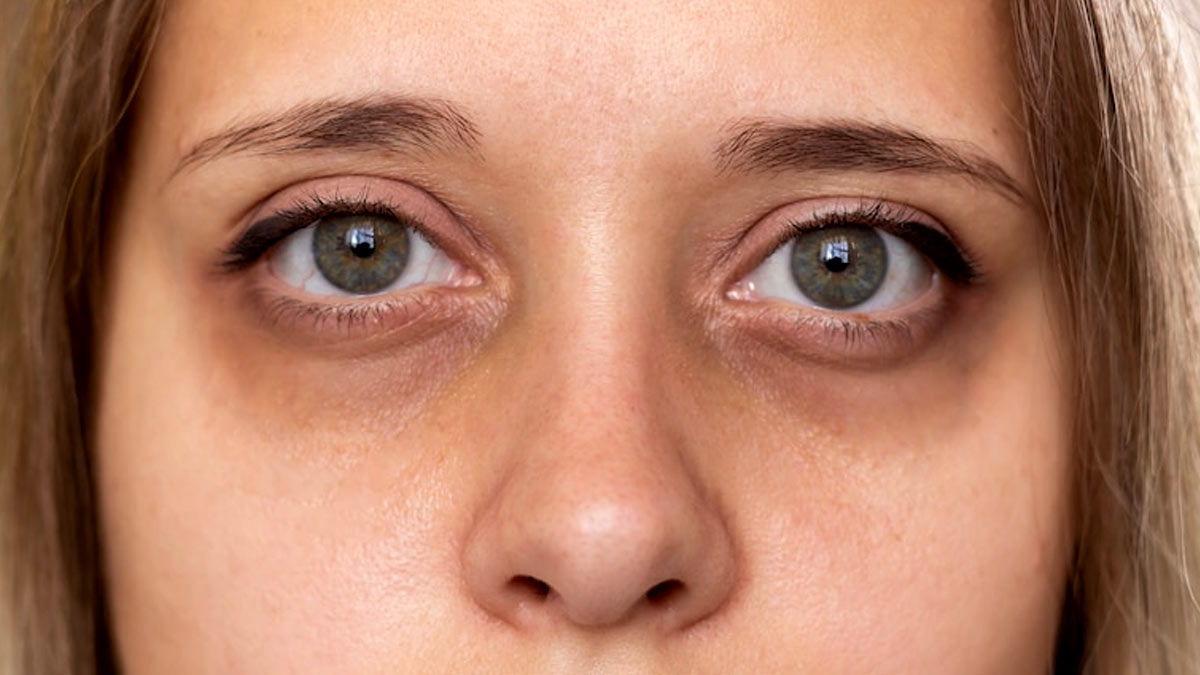Do Late Nights Really Cause Dark Circles? Find Out Here
We've all been there: a late-night work period, a compelling movie marathon, or maybe even a social event that ran well into the early hours and the following morning, a brief look in the mirror spells out our fears for us. Well, you know we are talking about dark circles. However, is it really that easy? We spoke to our expert, Dr Bhumesh Tyagi, Consultant- General Medicine and Physician, Shardacare, Health City, Noida, and here is what he shared with us.
Although a lack of sleep is undoubtedly associated with the presence of dark circles, the connection is a bit more complicated than a simple cause-and-effect formula. Read ahead to know what causes those shadowy circles under the eyes and see whether a few late nights alone are the culprit.
Dr Tyagi confirmed that it is true that a lack of sleep makes dark circles worse. The reason is as follows:
When you're deprived of sleep, your blood vessels dilate. Your skin under the eyes is extremely thin, so the engorged blood vessels become more prominent and the area appears darker, bruised.
Sleep deprivation may also cause fluid retention, especially under the eyes. The puffy effect of fluid retention tends to make the visible dark circles seem more pronounced.

Tired skin tends to pale because blood circulation decreases. Pallor makes the deeper vessels and any discolouration of the skin stand out more.
So, late nights don't form dark circles de novo, but they function as a spotlight, bringing out and highlighting existing tendencies. Consider it more of an amplifier than the lone architect.
“The reality is, dark circles are too frequently the result of a multifactorial combination. Blaming them exclusively on late nights ignores a multitude of other major culprits,” Dr Tyagi highlighted. Other causes may include:
This is usually the most prevalent and overlooked reason. If your parents or immediate family members have large dark circles, you have likely inherited the tendency for thinner skin around the eyes, more noticeable blood vessels, or greater pigment buildup in that region.
Some people naturally make more melanin (the substance which colours skin) under their eyes, causing a brownish staining. This is more likely in darker-skinned individuals and can be enhanced by sun exposure.
When your body lacks fluids, your skin can look pale, and the blood vessels underneath your eyes can become more visible.
Allergic reactions can cause inflammation and congestion in the blood vessels around the eyes, leading to puffiness and dark shadows. The constant rubbing of itchy eyes due to allergies can also worsen the situation.
With age, the skin thins naturally and loses collagen and elastin. Due to this loss of volume and elasticity, the blood vessels on the underside of the eyes are more prominent, and the hollowing of the tear trough region can produce shadows.
Though rarer, some deficiencies, such as iron deficiency (anaemia) can cause pale skin and more prominent dark circles.
So, do late nights actually create dark circles? The answer is a qualified yes, they can easily exacerbate and worsen them. But it's not often the only cause. Dark circles tend to be a mix of genetics, lifestyle, and environmental factors. If you learn the different causes, you can take a broader approach to dealing with them, beyond complaining about that one late night and taking a more holistic route to brighter, healthier eyes.
You may also like...
Diddy's Legal Troubles & Racketeering Trial

Music mogul Sean 'Diddy' Combs was acquitted of sex trafficking and racketeering charges but convicted on transportation...
Thomas Partey Faces Rape & Sexual Assault Charges

Former Arsenal midfielder Thomas Partey has been formally charged with multiple counts of rape and sexual assault by UK ...
Nigeria Universities Changes Admission Policies

JAMB has clarified its admission policies, rectifying a student's status, reiterating the necessity of its Central Admis...
Ghana's Economic Reforms & Gold Sector Initiatives

Ghana is undertaking a comprehensive economic overhaul with President John Dramani Mahama's 24-Hour Economy and Accelera...
WAFCON 2024 African Women's Football Tournament

The 2024 Women's Africa Cup of Nations opened with thrilling matches, seeing Nigeria's Super Falcons secure a dominant 3...
Emergence & Dynamics of Nigeria's ADC Coalition

A new opposition coalition, led by the African Democratic Congress (ADC), is emerging to challenge President Bola Ahmed ...
Demise of Olubadan of Ibadanland
Oba Owolabi Olakulehin, the 43rd Olubadan of Ibadanland, has died at 90, concluding a life of distinguished service in t...
Death of Nigerian Goalkeeping Legend Peter Rufai

Nigerian football mourns the death of legendary Super Eagles goalkeeper Peter Rufai, who passed away at 61. Known as 'Do...





